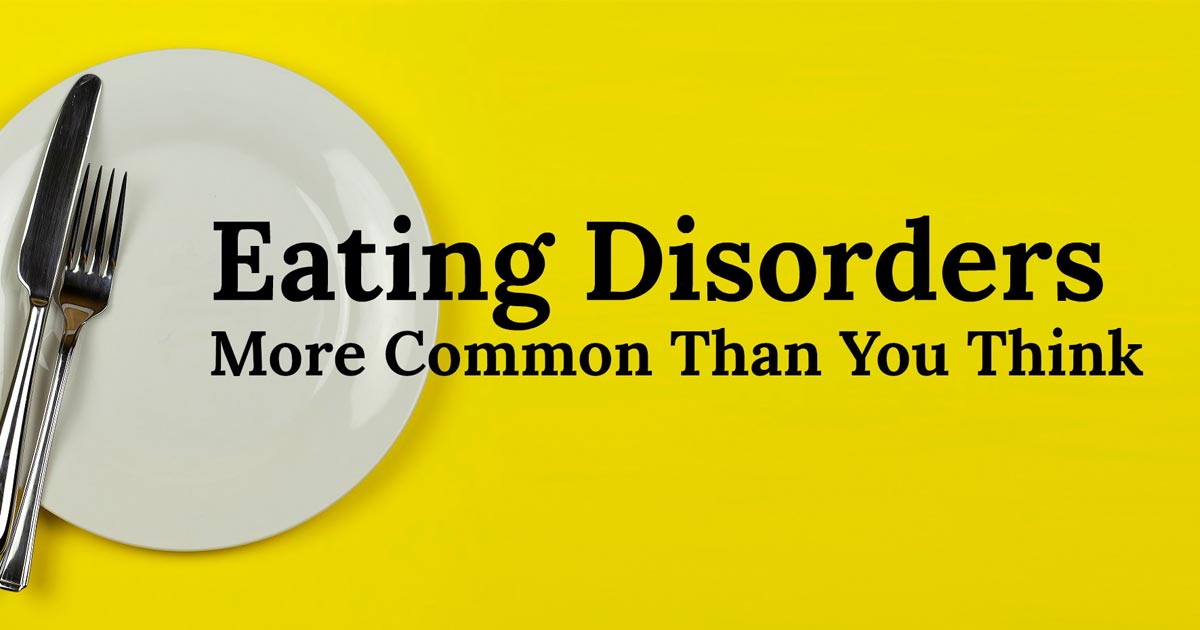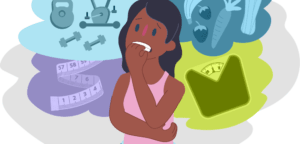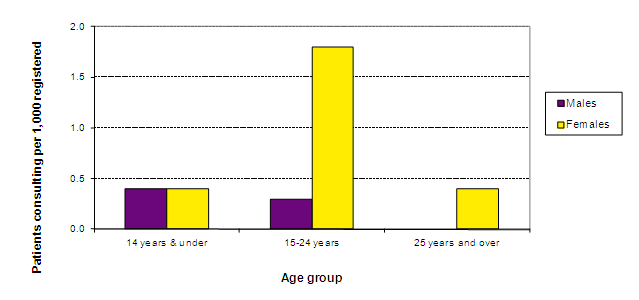Eating disorders are serious mental illnesses that can have fatal consequences. Between 30 to 40 million people in America have an eating disorder, and 10% of those cases are life-threatening or even deadly. In this blog post, we will cover some facts about eating disorders. Eating disorders can be hard to understand. But this post will help you better understand them and their impact on people who struggle with these issues.
Contents
What are Eating Disorders?

Eating disorders happen when people think about food and their body in a bad way. Eating disorders are medical conditions. There are two main types: anorexia nervosa and bulimia nervosa, but there are other less-known forms as well. Some examples include binge eating disorder (BED), diabulimia, and night eating syndrome (NES).
Eating disorders do not discriminate based on race, gender identity, or sexual orientation. They can affect anyone at any time of life — even children as young as 14 months old. People who have anorexia are worried about how they look. They try to lose weight by doing things that make them sick, like not eating anything. People with bulimia tend to have an obsessive focus on food, weight, and being thin as well. They are prone to binge eating or purging their bodies by making themselves vomit after they eat.
People who have these conditions often feel very alone. It is hard for others to understand what they go through every day.
Common Eating Disorders

Millions of Americans have eating disorders. They do not get treatment or even know they need it. People with eating disorders might think they are not hurting anyone else. But they are. They might feel like their problems are not that big but it is still wrong, and other people can get hurt too.
Some common eating disorders are as follows:
- Binge Eating: This occurs when people eat a lot of food in one sitting. They might feel like they do not have any control and that their eating behavior is out of hand.
- Bulimia: This involves taking part in binge eating then purging the body by making themselves vomit or using laxatives, diuretics, diet pills, enemas, or other medications to get rid of the food they have eaten.
- Anorexia: People with this disorder think about their weight and body a lot. They do not want to eat anything because it might make them gain weight. In order to lose weight, people who have anorexia may try exercising too much or trying starvation diets despite being underweight.
- Diabulimia is a type of bulimia that occurs in people with diabetes who do not take their insulin medication or skip it on purpose to lose weight. They may also exercise too much. This can become dangerous because they will have high blood sugar levels and be at risk for low blood sugar.
- Night Eating Syndrome: People with this condition do not have control over their eating behavior during the night, and they eat a lot throughout the day too. They might be tired or stressed at work because of all of this uncontrolled eating which can make them gain weight quickly.
- Restrictive Food Intake Disorder: This is a rare and severe type of eating disorder. People with this condition may not eat enough to stay alive. They might be afraid or embarrassed about food and their bodies, which causes them to avoid consuming anything even though they are hungry.
- Pica: This is when people eat things that are not food. They might swallow non-food items like paper, soap, or metal objects as well as dirt and other substances.
- Rumination: This occurs when people regurgitate their food and either spit it out or rechew it. They might try to hide this behavior from others, but it is still a sign of an eating disorder.
Extreme Dieting
This happens when people severely limit their food intake, usually to lose weight. Some may do this by fasting or going on a very strict diet that is not healthy for them even if it helps with the short-term goal of losing weight.
Eating disorders are dangerous and can lead to long-term health problems, hospitalization, death from malnutrition, and poor quality of life. But people with eating disorders can be helped if they accept the help that is offered to them.
People who have anorexia do not think they are sick despite what their body tells them about needing food or how much weight it has lost already. Following are the consequences of extreme dieting:
- Decreased energy level: People feel tired and weak all the time.
- Increased risk for illness: People have a harder time fighting off infections because they do not eat enough food to keep themselves healthy. They may develop heart problems, osteoporosis or other bone disorders, kidney disease, or sexual dysfunction as well.
- Loss of menstrual periods: This is common in women, especially if they are underweight.
- Neglect of personal care: People might not take a shower or even brush their teeth because they want to try and lose more weight. They may also feel ashamed about the way they look which makes them use starvation as a weapon against themselves.
- Loss of muscle mass: This is due to the lack of protein and energy that is needed to build muscle.
- Social isolation: People might not be able to take part in social activities because they are too tired or embarrassed about themselves physically. They may even avoid their friends altogether as a way to cope with how they feel inside.
- Physical harm: Starvation can cause memory loss, muscle spasms, heart failure or irregularities, osteoporosis, and seizures.
Why Do People Develop Eating Disorders?
People with eating disorders might be trying to control their weight and food intake in an attempt to avoid looking like someone they are not happy being. They may also use this as a way of coping with problems that they do not know how to deal with otherwise.
- Physical issues: People who have had bariatric surgery or experienced trauma sometimes develop these conditions.
- Emotional issues: People may feel sad, anxious, or depressed about themselves. They might even hate the way that they look and try to change it by eating less or throwing up after eating something unhealthy.
- Family troubles: Families can be dysfunctional with members who struggle with addiction problems like alcoholism or drug abuse. There is also a greater risk for these disorders when people are coping with other mental health issues.
Eating Disorders And Mental Health

People who have mental health issues like anxiety or depression are more likely to develop an eating disorder. They might start this because it gives them a coping mechanism. It is also possible for people with the bipolar disease to get bulimia nervosa if they go through manic periods where they eat large amounts of food. They might have problems with this.
Eating Disorders And Age Groups

Men
Men can have eating disorders, but they are less common among them than women. Those who want to be muscular and lean might develop these problems. They might do this because their partner has anorexia nervosa and they see themselves that way too.
Teenagers
A higher risk for developing an eating disorder is in teenagers because they are going through so many changes. They can be emotional and physically changing. It can be hard for people to accept the new person that they are becoming. They might feel left out of what seems to be everyone else’s natural development process.
Women
Women and girls are more likely to get anorexia nervosa, bulimia nervosa, or binge eating disorder. Sometimes people feel judged about their weight by friends or family members. This leads to them not eating around them. They might have problems with this. Sometimes, women change their behavior because they think that what they do is what their partner wants for them.
Older Adults
People who are older might get an eating disorder because they become less independent and it is hard for them to do things on their own. They want to continue living in their homes and eating the way they have for a long time.
Children And Adolescents
Parents should pay attention to whether their children are gaining weight or losing weight. If they see that their child is not gaining or losing weight, then they need to talk to a doctor. Parents should pay attention to what food might make their kids sick. Don’t let them eat junk food all the time.
LGBTQ+ Communities
People who are in the LGBTQ+ community are more likely to develop eating disorders. This is because people in this group can face bullying and judgment about their sexual orientation. People might go through periods where they don’t eat. This is to find out what it is like to be hungry. They will know how it feels before they ask friends and family for help. There are different ways to treat transgender people. They include hormone replacement therapy and surgery.
Eating Disorders Counseling
Counseling can help people recover from eating disorders. They might work with a therapist to learn the best way for them to cope in certain situations. It is also important that they talk about their feelings and deal with whatever it is that triggers this response inside of them. This will allow them to handle these issues without developing an eating disorder as a result.
Helping Someone with Eating Disorders
If a loved one has an eating disorder, it can be hard to figure out what to do. You may feel overwhelmed and helpless because you’re not able to “fix” your loved one. It is very important that you help your loved one get better. You can do this by helping them find courage, motivation, and strength.
There are some important things you can do to help someone with an eating disorder:
- Keep the lines of communication open. Communicating with your loved one can be hard. They might not want to believe that they have a problem, or they might not know what to do about it. You should try to communicate with them when they are ready, and then you will be able to help them get better. Also, you may feel like screaming or crying because you are so frustrated, but you should always be supportive.
- You can help your loved one get better by encouraging them to eat healthy foods and avoid fad diets. You might want to suggest that they go with you on walks or bike rides together. This will give you a chance to talk about the problem, share memories of times when things were easier, or just enjoy some peace and quiet together.
- You should not try to help your loved one get better by yourself. It is very hard for you, too. You need support from friends, family members, and professionals who understand eating disorders. When you talk to anyone else about your loved one’s problem, make sure that they know how dangerous eating disorders are.
- You can help your loved one get better by seeing a doctor about the problem. You might not want your loved one to go, but you can say it is for his or her own good. It won’t be scary.
These tips can help you get started helping your loved one. There are many things you can do. Your loved one will need to make the final decisions about getting better, but you can help them see that there is hope. It’s not their fault. They are not alone in this fight.
Conclusion
Eating disorders are mental disorders that can be treated. If you have an eating disorder, it is important to get help. Please know that there are people who care about you and want your recovery process to go as smoothly as possible. You do not need to suffer alone anymore!
If you are looking for affordable Online Counseling MantraCare can help: Book a trial therapy session


